#that’s when he adheres to Batman’s rule
Text
Danny Fenton goon union representative (dp x dc fanfic prompt)
At no point in Danny's life has he ever turned down a challenge, even when he had to deal with opponents bigger than himself. From dealing with everyone from Dash to Vlad to heck pariah dark, he's learned to take down people bigger than himself. So when he overhears that his nice father of four neighbors has been having some trouble at work and has been unable to get some time off, he figures it can't hurt to try to help such a nice guy out. And it does go ok, all things considered; I mean, what if the guy's boss was the penguin, and so what if Danny maybe had to show off some of his less-than-human characteristics to get him to agree to let the guy have some time off? Everything worked out at the end of who cares.
Well, when word gets out that someone is not afraid to go tow to tow with the city's villains, someone's bound to either take him out or hire him. And when word gets around that he's willing to help get better working conditions for Gotham's goon workers, their union could use a new representative.
So Danny inadvertently gets a new job, wherein he gets to meet many strange characters around the city and help many friendly working-class people with their problems. Interchange the goons help hide Danny from the bat, and his no meta-rule, even if Danny doesn't know they're hiding him. But this does cause some problems because people like black mask don't necessarily want to pay for their goon's vision care or overtime and refuses to adhere to any of the union's demands. Danny, for what it's worth, did warn the guy because, unlike black mask, he has the goon's respect and knows that they will listen to him, so when he proposes a strike, they readily agree to his suggestion.
And with all of this going down so quickly in the city, both batman and the red hood need to get as much info on this new player before things get even more out of hand. But with all of the normal underground information channels refusing to give them anything, they are forced to schedule a meeting with not only the union but its infamous leader, which is good for Danny because he wasn't sure how to get into contact with batman anyway. He has some concerns with the level of violence used to take down some goons. And well, when they have no choice but to work in this industry, they should, at the very least, outline a clear code of conduct for all parties involved to ensure the safest possible work environment.
#danny phantom#danny phantom crossover#dc x dp#dp crossover#dp dc crossover#dp prompt#dp fanfic#dc x dp prompt#batman#red hood#black mask#my man fights for the little guy#eldritch danny#who cares if he might not be human he helped Phill get dental added to the list of benefits#fanfiction prompts#dcu prompts
3K notes
·
View notes
Note
Slightly dark/insane batfam who is overjoyed to have Jason back from death is one of my favorite aus ever. Like imagine Bruce being oh so proud of his son who ended entire gangs and built an empire in a matter of months before he even turned 19. Ofc he's gonna brag to this fellow JL members. His kid is just so driven and smart! Jason has no idea if they were always like this or if his death made them this way but he's not complaining (much).
Ooo that would be interesting!
Like, a Batman who still doesn’t kill and adheres to his moral code but has absolutely no problem if his kids turn murderous. He’s a proud and supportive dad either way, the only rule he has is that they keep it strictly to criminals and leave alone the regular civilians.
He went a little cuckoo when he lost Jason. As did Dick. (And Tim wasn’t sane either way lmao)
#Tim is my little chaos gremlin#Steph isn’t any better#cass is an angel ✨#duke would like to mention that he’s very scared of them all#but still loves them#Damian is pleasantly surprised by his father’s moral flexibilities#but he decides to take the no killing thing as a challenge#the JLA don’t know what kind of shit show they stepped into but they’re glad someone’s handling Gotham#they know the day Bats kills someone is the day the need to evacuate earth lmao#ghost talks#batfamily#jason todd#dick grayson#batfam#robin#bruce wayne#red hood#tim drake#batman#duke thonas#cassandra cain#Stephanie brown#Damian wayne
388 notes
·
View notes
Note
Heck speaking of that last ask, whose to say even for Dick’s more professional and cordial moments with those outside his family or closest allies, whose to say those aren’t a front to mask his more serious and strategic cunning to through those other people off guard if they’re suspected of doing bad?
I CAN'T BELIEVE YOU ASKED THAT BECAUSE YOU'RE SPOT ON!!!!
This actually happens in canon but this time it's within the family.
In Batman and Robin Eternal the whole Batfamily is forced to a clean up a lethal mess that Bruce wasn't able to solve during his and Dick's days. Their opponent is a woman named "Mother" for which she is aptly named because her brilliance and manipulation were so high that Bruce was forced to admit defeat, unable to deal with her.
During the investigation, the rest of the batfamily is blissfully unaware of Tim's actions, histories, and secrets-except Dick.
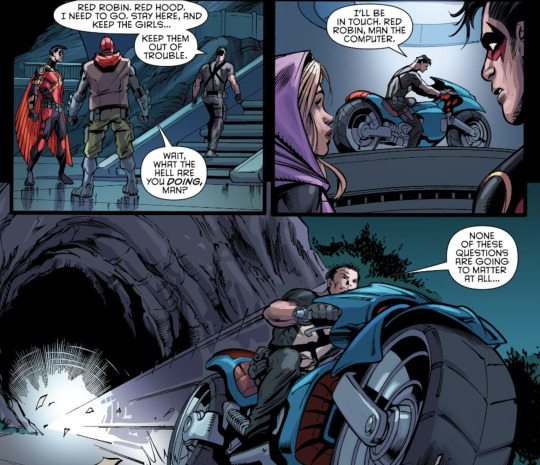

While leaving the rest of the family in the dark to avoid raising suspicions, he goes to get some answers.
Of course he would never betray his family's trust without some evidence.


While Jason and Stephanie are busy yelling at each other, Tim quietly sneaks away to answer a call by "Mother." Dick is at the Drake's while this is happening thus indicating that both Dick and Tim have their own share of secrets and battle plans.

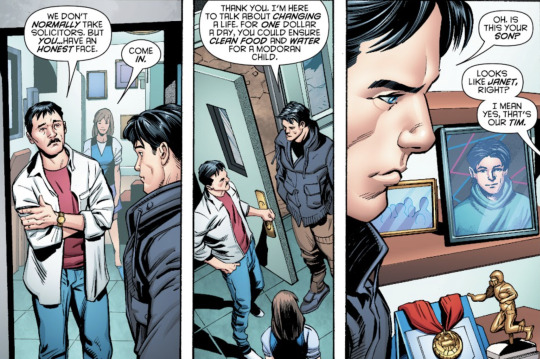
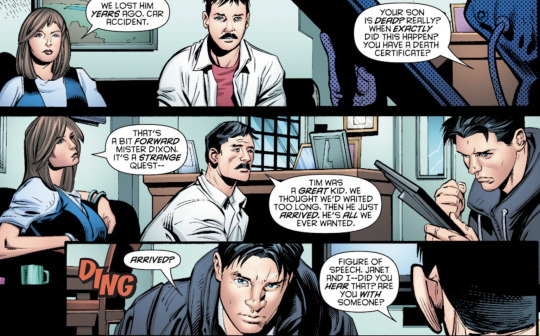
He asks questions about Tim to his parents as if he's never met Tim before. Someone should get this man an Oscar.
Of course everything goes to hell when an operative of Mother's shows up and starts firing at Dick. Tim's mom utters a codeword that isolates her and Jack and also notifies Tim. Dick neutralizes his opponent.

And then Tim shows up.
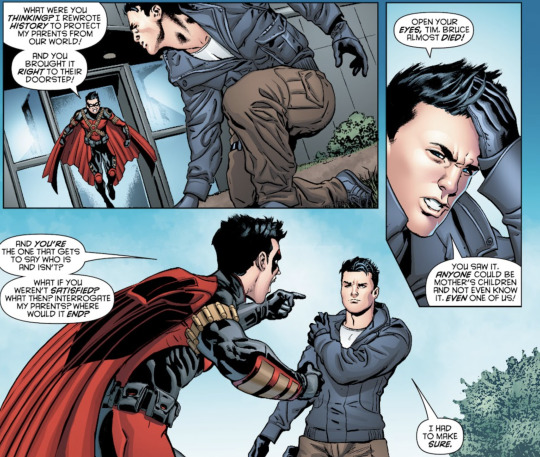

"It's your secrets, Tim. I respected your privacy. Never looked too close, until that became a luxury I couldn't afford...I thought you weren't one of Mother's children. Hoped you weren't. But I had to know."

While Tim is rightfully hurt, but the thing is-they can't trust anyone right now because Mother, their enemy, is inseparable from the batfamily. She gets into people's heads and uses them as operatives over their entire lifetimes from childhood to adulthood. And first and foremost, Dick is a detective. It's ingrained into him to identify any threat and act accordingly.
This scene is extremely important because Bruce was almost killed by Mother and Dick loves Bruce. For his part Bruce almost killed their world just so Dick could live and reversely, Dick would do anything to make sure Bruce was safe.
But here's where Dick's manipulation and cheerful demeanor come into play. The batfamily has no idea how good Dick is at manipulating people.
When Dick runs off to do this, they only say

They have no idea.
Dick never does anything without a plan, a backup, and a safety net. The only mistake in their understanding is that while they think that Dick looks for a safety net second, they don't know that Dick's already created his own net and the one they see is the one Dick tossed out to his allies when he needs them to catch him.
Even now, Tim only found out because his mom activated the alarms in his house. If Dick's enemy hadn't blasted in and opened fire at him then it's suffice to say that everyone would be none the wiser about his little side quest.
I don't think the batfamily will ever realize how cunning he is. They see him as a kind older brother who is too adherent to Bruce's rules. Afterwards Jason makes fun of Tim in an older brother way by implying if he's mad at his mommy lol.
The DC vs Vampires and why every single member of the family was blindsided was because they underestimated him and never expected it of him. That's how good of a manipulator Dick is and that is why they will never know.
Tim once said Dick was "ranting and raving" in Arkham during Future State but for someone who had supposedly lost his mind, he still was the reason they defeated the government and came out on top. Future State: Nightwing is a peak example of Dick's genius when it comes to controlling people even if it seems like lunacy from the outside.
Everyone sees him as the nice one and Dick is the nice one of the family but when his family's life comes into danger he will unearth any secrets that he let you have in order to keep them safe.
So basically he'll let you do anything: keep secrets, lie to him, ignore him, but if you endanger his family he is coming for you because as the song lyrics goes-
"I may be next to you but you don't know I'm undercover."
And that is what makes his character so excellent. The greatest spy and threat the good has ever had.
This is my favorite personality trait of his because he's the James Bond and Mata Hari of DC.
#everyone wants a piece of him but they will never know him#asks#manipulative dick grayson#cl paladin of nerd fandom65 asks
252 notes
·
View notes
Text
there's a scene in "cold comfort", an episode from the new batman adventures (you might've seen it around on tumblr) where timmy todd has failed a civics test. tim says he doesn't care about what a district attorney does, bruce tells him he doesn't know anything about the american justice system, tim replies it's "bogus". when bruce asks how did he come to "that well-thought-out conclusion", tim, cheeky, replies "watching you", saying that bruce doesn't exactly follow the rules of due process (bruce tries to change topics asking about his math test).
and it's a funny moment and all but (because I'm me) it made me think of it in the context of jason's character. first, idk if the show does anything more with tim in an academic setting, but this is a contrast with new earth!jason that speaks to a more "stereotypical" idea of a street smart kid.
second, while presumably tim would've seen the flaws in the system before as well, this moment carelessly implies certain ignorance (like i'd care about what a district attorney does when I was a petty thief / you don't know the first thing about the justice system, do you) and jason's mistrust on the system came across as coming from someone who, thanks to his experience, had a really good grasp on it, and that said knowledge was what made him mistrust it. he preferred to be on the streets that in the hands of gotham social services (my personal headcanon was that he was under their care previously for a little while, and then things went sideways and he had to run). he runs from ma gunn's. he argues for penguin's potential rehabilitation to bruce. etc. etc.
and third, jason's journey was more about... first, seeing the flaws in the system, then agreeing to work with bruce in what seems an alternative, better way, then seeing the flaws in BRUCE'S system, the way victims still fell through the cracks. this scene puts the sole focus on bruce's worldview, with tim (even if it's part of a joke) adhering to bruce's. this is literally the third episode, I know there's more, plus comics, so maybe they do more to build up tim's independent views (though idk if it'll be within is vigilante tenure or as part of the return of the joker's plot, whose specifics I don't recall well).
either way. food for thought.
#talking to the void#my thoughts#dc#dc thoughts#dcau#the new batman adventures#dc comics#jason todd#timmy todd#tim drake
38 notes
·
View notes
Text
I remember a post where someone said that Batman isn’t adopting orphans to turn them from children into vigilantes so they’ll end up like him (a hero), but that he’s adopting orphans to turn them from vigilantes into children so they’ll end up like him (not a villain). I think the point was that most of the Batkids were already on a path that could potentially lead to crime and villainy by the time Bruce got to them, so taking them under his wing and mentoring them kept them from losing their way. Can’t find the post again, but I feel like reprocessing it by rephrasing it for myself.
You can’t make choices for people, but people have to have the choice in the first place. If you don’t have the resources and the support to harness your pain and suffering and channel it into something productive and honorable, it has the potential to become something much worse. If you don’t have the means to heal, then healing isn’t going to happen. In the case of Gotham, ‘something much worse’ appears to happen on a semi-regular basis and results in a new member joining Gotham’s Rogue gallery.
I’m a firm believer that once Bruce realized the best way to keep crime down was to intercept the would-be-Rogues before they arrived at the point of violence, Wayne Enterprises started pouring as much into Gotham’s welfare and societal infrastructure as waynely possible. The existing Rogue gallery is kept at bay through cooperation with Gotham PD, trying and failing to make Arkham Asylum effective, and being the Batman. They will die, not by Batman’s hand but one way or another, eventually. What if Bruce could starve out the violence and the crime? What if those who made their choice and refuse to change their ways bear the consequences of their actions, grow old, and no one picks up the slack behind them? What if people see that, BECAUSE Batman refuses to kill and forces the villains to face the music rather than escape through a quick death, villainy isn’t the answer and doesn’t fix anything? All villainy earns you is a punch in the face and a trip to jail or an understaffed asylum. If you want your life to get better, you have to find another way because crime clearly won’t work. Sure, this would never deter everyone, but it might bring the numbers down just enough to make a difference.
And then Bruce finds these kids. Kids who are alone or hurt or stubborn or scared and for one reason or another, Al even at their young age, they’re already at risk of choosing the route of villainy. They have the reasons, they have the motivation, they have the skill. Bruce looks around and sees that no one else is stepping up to intervene.
So he redirects them. He establishes himself as their primary authority figure (just as Alfred did for him, whether he had the same mentality as Bruce or not) and lays the no-killing rule on thick. He trains them and makes them better than the villains that already are and the villains that will be and the villains they might have become without him. He gives them a place to call home, if they so choose. He lets them be kids, he lets them be HIS kids, and slowly the family builds over time. He gives them a choice to reject villainy and he makes it enticing. He makes heroism look a little more fun, he makes it seem a little bit easier, and he makes them a little bit braver.
They make their own choices. Not all of them adhere to the no-killing rule the way Bruce does. Not all of them stay home and dwell in Wayne Manor full time. Not all of them even stay in Gotham.
But they don’t become villains. With very few exceptions, the Batman rarely stands against his kids. Whatever they are, it’s miles away from what they might have been without Bruce. It made a difference. The danger Bruce saw when he met each kid did not come to pass.
21 notes
·
View notes
Note
riddler x Bruce headcanons yippie
Aaa ok!! I personally don't ship riddlebat but I think the ship is cute so srry if it's out of character!!<3
Cw for stalking lolz

• Bruce calls edward "ed" because Edward doesn't like his name and Bruce thinks it's kinda cute(he'll never admit to it tho)
• Edward has a photo album dedicated to Bruce and is constantly take pics of him without Bruce knowing
• Edward writes a lot of love notes for Bruce but rarely sends it to him
• They solve crimes together on date nights‼️(edward loves to help solve the difficult puzzles for bruce)
• Both their sleep schedules are extremely fucked up so they see eachother at the most random times
• Edward has extreme attachment issues and is constantly all up in Bruce's space(bruce tolerates it for the most part)
• Both autistic so when one or both of them get really burnt out they just sit together in silence and watch a show they both like and hold hands
• They both go to operas together for dates!!
• Edward is very touchy while bruce finds being touched uncomfortable so they typically settle for holding hands
• Edward has ocd so bruce does everything he can to a adhere to Edward's "ocd rules"
• Edward forces bruce to watching cheesy romance movies(bruce acts like he doesn't like them but Edward knows he secretly does)
• Edward stalks every single person bruce has ever dated or talked to on social media
• Bruce will see things he thinks edward would like and buy them for him
• Edward stalked Bruce months before they met
• They met in a diner at like 1am bruce was getting coffee after a night out being batman and edward followed him there getting the courage to talk to him
18 notes
·
View notes
Text
Relationship Compromise in Batman/Catwoman
(or: I'm not sure Tom King knows just how bonkers what he wrote is and I don't know what to do with that)
Batman/Catwoman concluded this past June, and I did not enjoy it, and it haunts me.
Just... when I read a story and what the author apparently thinks is happening does not align with the events on the page, I can't help but feel some fascination. The final page, in B/C #12, is definitely the most dissonant:

What a romantic scene, the pin on a tale of love triumphant! If you ignore many of the events around it!!
I try not to be too much of a dick even about things I don't like. Regardless of my opinion, Tom King wrote twelve dang issues interweaving three different time periods, so he put some measure of thought into it. So at the conclusion of my first read, when my reaction was "lol what," I still thought maybe the spliced time periods were hiding something from me. That narrative tactic is typically used so that an event that happens in one period of time can directly comment on an event that occurs much earlier/later, and there was some of that in B/C, but its main effect was muddling the story. Plus I read it over the course of 17 months! Maybe I missed something, something that made it allllll come together.
So during my second read, like a sane person, I cut up all the panels and sorted them into the three different tracks. And then I read the story again chronologically, and this time my reaction was... *resoundlingly* "lol what."
And I will explain why at length under the cut (with many many spoilers, as well as remarks on dismemberment and suicide).

(A more fitting final takeaway from much earlier in the story, B/C #3)
Ostensibly, Batman/Catwoman is about Selina keeping an identity of her own while making her relationship with Bruce work; it's about compromise, about love persevering through conflict. Yet again and again, whether I read the story the way it was published or chronologically (for a total of five times!), I kept seeing Selina so bitter about those compromises that, to keep the relationship going, she tells Bruce two brutal lies that make the final page of B/C come off as a joke.
Again, it's this dissonance that bothers me. I ship batjokes. If you want to tell me a tale about screwed up relationship dynamics and people managing to love each other in spite of them in their own bizarre way, I'm into it. That's interesting! A lot of B/C was interesting, until the framing kept trying to tell me it was ultimately a love story that all worked out.
This journey of Selina's, which is as much about her relationship with Joker as it is her relationship with Bruce, takes place over three different Christmas seasons. Presumably this is a reference to the Ghosts of Christmas Past, Present, and Future, so I'll use those labels:
Past Track: In their earlier years, Bruce and Selina attempt a relationship while Selina tries to hide that she's drinking buddies with Joker.
Present Track: Years later, some point after King's Batman run, Bruce and Selina's relationship has progressed to them living together, with Selina helping Bruce fight crime. Andrea Beaumont reappears in Gotham and asks them to help search for her lost son, and she goes on a murderous revenge spree when it appears that Joker killed him.
Future Track: Decades later, Bruce dies of sickness in his old age, and the widowed Selina tracks down Joker and finally kills him. Helena/Batwoman (her and Bruce's daughter) and Commissioner Dick Grayson attempt to bring Selina to justice.
(These descriptions just set the scene for each time period. The plot gets too convoluted to sum up, so you'll have to read B/C if you want all the story beats. Godspeed.)
Selina's first big lie is actually pretty understandable. It comes up early in B/C #2 in the Future Track, when she slashes Joker's throat.
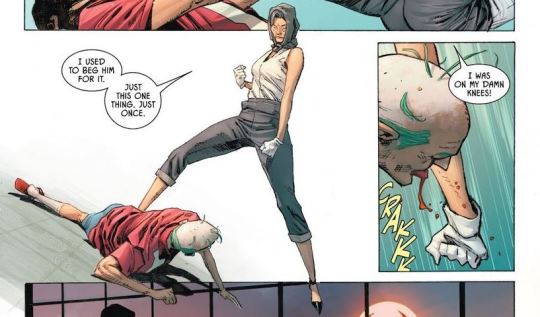

Bruce's refusal to kill including Joker is an oft-voiced frustration not only in fandom but within the comic universe. It's clear here that Selina agreed to adhere to this rule while Bruce was alive. Then she, as his wife, when he was on his deathbed, lied to him about one of the major principles of his life.
Certainly, what to say to Bruce about her intentions must have been a tough call. As he slipped away, Selina could have either lied to his face or told him that she was going back on her word. Both are not great for different reasons! Of course, she had a third choice, which was honoring Bruce's wishes, perhaps having come to see eye-to-eye with him over the years, the kind of understanding you might expect in a story that ends with a kiss that belongs on the cover of a bodice-ripper. But the crux of B/C is that Selina did not agree with Bruce on this, and over the next ten issues we learn more about why, after Joker has apparently been untraceable for ten years, she felt the need to hunt him down.
Plus it's not like Joker doesn't have a point; it is kind of darkly, desperately funny for Bruce to expect loved ones to stick to his rules after he's dead, like they're appendages of him instead of their own people. Even when Bruce was dying, he was trying to exert control. And this idea coming up so early, it feels like that is what B/C is supposed to be about: Selina's independence stifled by Bruce's need for control.
This conflict is starkest in the Past Track when, instead of trying to kill Joker, Selina repeated refuses to sell him out:
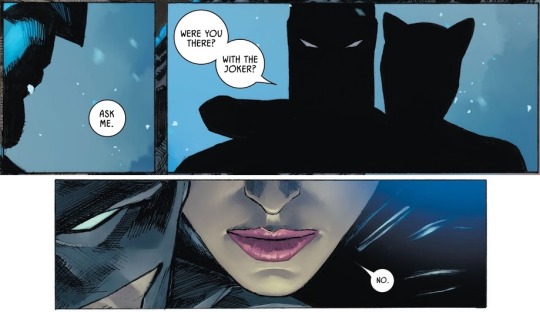
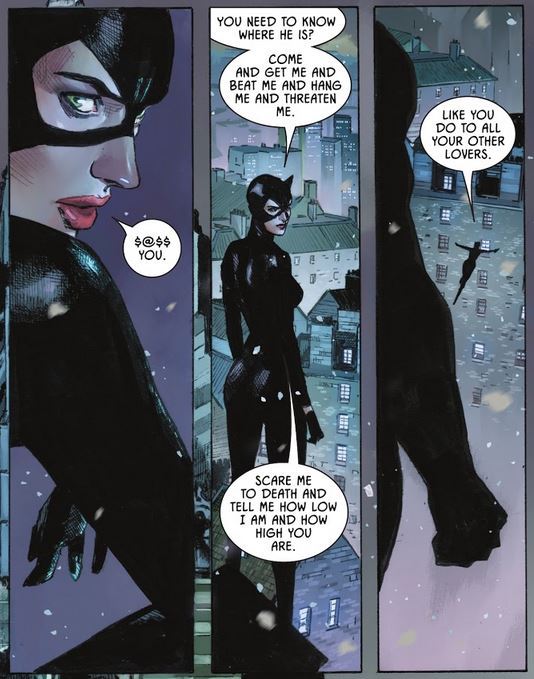
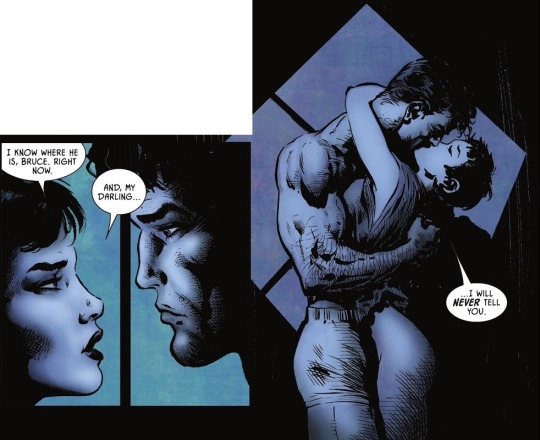
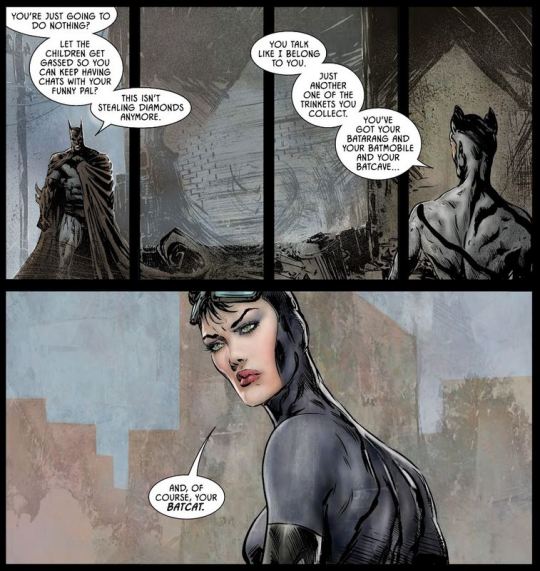
(Selina, people are dying.)
Naturally, Joker adds to the friction by encouraging Selina's identity crisis:
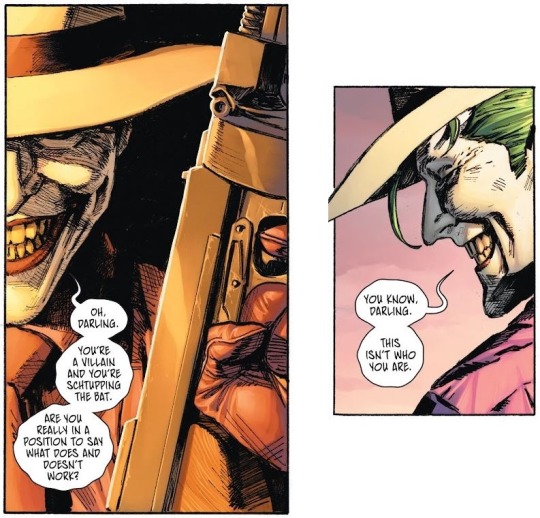

Of course he's saying these things because he's ultimately only "friends" with her in hopes she'll disclose Batman's identity and location to him.
And given Joker's behavior, it feels like Selina is only "friends" with him too, that her attachment is more about the freedom it represents for her, about her refusal to be consumed by Bruce— though it's still hard to buy. Joker's characterization remains the wildly murderous maniac he's been for ages now. I can see a tamer version of Joker charming his way into a friendship with Selina, but she's not the type of person to brush off mass murder while casually trusting the mass murderer. Even in this very story!

Previously, Selina assaults Joker because when he poisoned of one of her marks, it left evidence that the two of them were in the same room together, but here, she wasn't involved in the reindeer "gag." She's just upset.
Yet before and after those assaults, Selina and Joker still have their buddy time, so her perspective is summed up by what is one of my most hated panels ever in B/C #8:
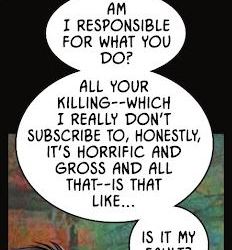
(Oh golly gee, who knew ignoring all this over-the-top murder stuff would feel ickily complicit!)
One way or another, Selina clearly doesn't like what Joker does, seeming to confirm that this friendship is really about her need for independence— until B/C #9, when Joker again asks for info on Bruce and it finally clicks for her that Joker's friendship is a fraud. Selina is just so shocked and appalled that this remorseless killer would betray her, that in B/C #10 the revelation escalates into a physical fight and speechifying:

(The fact that this never occurred to Selina until now is insulting to her character.)
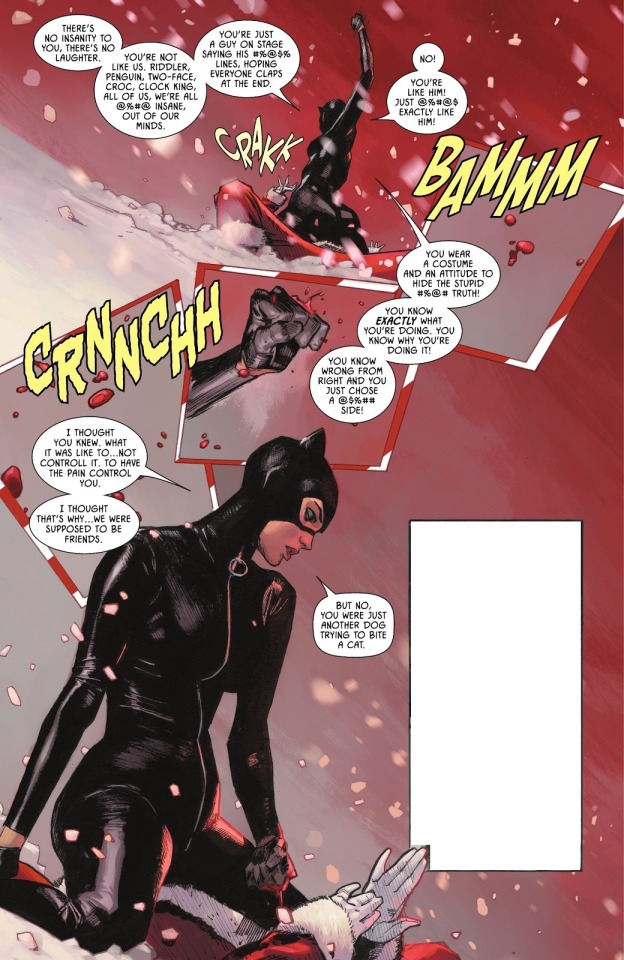
(I really hate her dialogue about the rogues' claims to insanity, but that's a whole other can of worms.)
The betrayal is all this fight is about. Selina is not protecting Bruce here; she's channeling a simultaneous frustration with Bruce. Selina is looking to be understood, and she's not finding that understanding. All she gets is Bruce asking where Joker is, and Joker asking who Bruce is. Therefore she decides: fuck both these guys.

You know what? Hell yeah! Go be your own person, Selina!
Uh, except the very next thing that happens in the Past Track, in B/C #11, is Selina turning around and giving Joker up to Bruce. I guess she meant "fuck" figuratively with Joker and literally with Bruce. Bruce asks her why she changed her mind, and she explains:
"He... Joker asked me if... If I was Batman or if I was Catwoman. Like... like everything in the world has to be this or that, one or the other. Like you can't just put the two together and make that work. [....] Also, he's the Joker. So @$%#% him."
Okay that actually explains jack shit, and you did not really "make that work" because this story references events in King's Batman run, which means you broke up again (probably several times) after this, but okie dokie.
So from the Past Track, we know that Joker violated Selina's trust, and she finds his murder gross. She did not try to kill him at that point, though; it's what happens in the Present Track that changes things. In that time period, presumably set some time after King's Batman run, Selina and Bruce are back together, and their conflict resurfaces when Andrea shows up. Andrea kidnaps Selina in an effort to get Bruce to turn Joker over for execution, and in a short time she convinces Selina that Joker deserves death for his brand of cruelty. The two women then conspire to get Bruce out of the way for the murder by knocking him unconscious and locking him naked in a bank vault with the alarm going off. Which is 1) hilarious, sure, but 2) giving strong Joker vibes?

(Some people theorize that Tom King is secretly a batjokes shipper. My theory is that he doesn't know he's batjokes shipper.)
I'm not saying Selina can't be funny; I'm saying that out of all the options she had to get Bruce out of the way, this is what she picked, while leaving a breezy btw-gonna-murder-now note. And this is far from the first time she has a Jokery flavor. The most egregious example is in the Future Track, when she discovers that Dick had Joker's body transported to Gotham, and she dismembers Joker's corpse and uses the pieces to decorate a tree:

(And a clown head on a fir treeeeeeee!)
Dick's dialogue is repeating a note left on the tree, which is referencing a joke relayed to Selina and Batman by a Joker victim in the Present Track: "what did Santa say when he got thrown down the chimney and landed on his head? Oh oh oh." But the problem with this grotesque display is that Joker can't experience the payback since he's, uh, dead, and Selina and Bruce were the only ones to hear this joke. I suppose Bruce may have told others about it, and certainly kept records about his cases, but still, why antagonize Helena and Dick with this specific line? Who is this for?
Allegedly, Selina is still just that angry about what Joker did to Andrea Beaumont, which feels inexplicable. The theory seems to be that Joker's manipulation of Andrea makes Selina feels a kinship with her. After the undefined version of Mask of the Phantasm that happened in this universe, Andrea hunted Joker down, only to find him with a baby that he referred to as his own child. To escape, Joker tossed the newborn into the air and ran off, and when she caught the baby... she found her inner pain suddenly soothed. (Yeah, yeah, I know.) Instead of continuing the hunt, Andrea named the baby Andrew (yeah, yeah, I know) and became his mother— and now all these years later, she finds out that Joker stole Andrew from a hospital, when the clown tricks her into coming with him to the family's home and blows them up. Andrea feels such horrible guilt about getting the entire family killed that she commits suicide right in front of Bruce and Selina.
An awful series of events... but I still find it strange for Andrea to be the only victim Selina name-checks in her final confrontation with Joker. She barely knew Andrea, a fact that's emphasized when Harley shows up. Selina has longer histories with other characters traumatized by Joker, but she doesn't say one word indicating that she killed him for Harley too. You could say it's because Selina's too focused on their fight, except she does find the mental space to declare that Harley never killed Joker because, like Bruce, Harley is a better person than she gives herself credit for.

(We've got two other cans of worms here we're not gonna open.)
Also, in the Present Track, Selina is strikingly callous toward the Joker victim who tells the Santa joke, when Selina and Bruce first encounter him...

... and when he falls off the bridge.

But okay, maybe on top of witnessing Andrea's suicide, it's the motherhood angle that gets to Selina. She doesn't seem too affected in the Present Track, but in the Future Track we see her interactions with Helena go from strained to violent, then come to a more loving resolution:
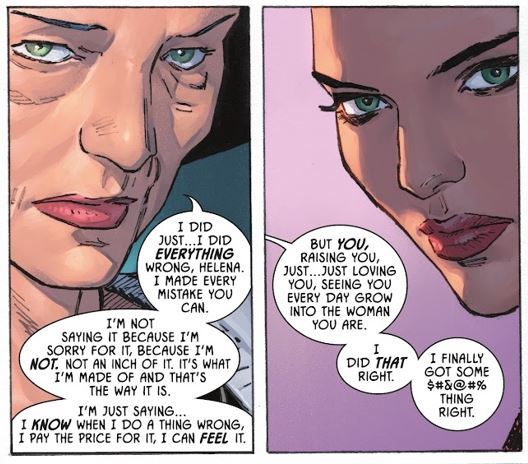
We can surmise that Selina's need to defy Bruce's rule and kill Joker only grew over time, as her relationship with her daughter deepened her understanding of Andrea's pain at losing Andrew.
Except LOL, SUCKERS. That interpretation is undermined by the pièce de résistance, the second and worst of the lies Selina tells.
Because, as revealed in the Future Track, Andrea is alive! Selina broke Clayface out of Arkham and got him to impersonate Andrea slashing her own throat so the real Andrea could run away and lay low. Andrea agreed to this in exchange for Selina eventually killing Joker. Selina has been planning to kill Joker for decades, since before Helena was born.
And, again, in case you forgot, the fake suicide happens right in front of Bruce by design, and there's no indication he ever finds out the truth. In the immediate aftermath, Selina even freaking brings up Alfred, adding to Bruce's feelings of failure and loss:

(These panels also featuring Bruce's glib, painfully out-of-character reference to his parents' murder.)
If that wasn't enough, Selina comforts Bruce by using this as an opportunity to reinforce that, in the end, all they have is each other:
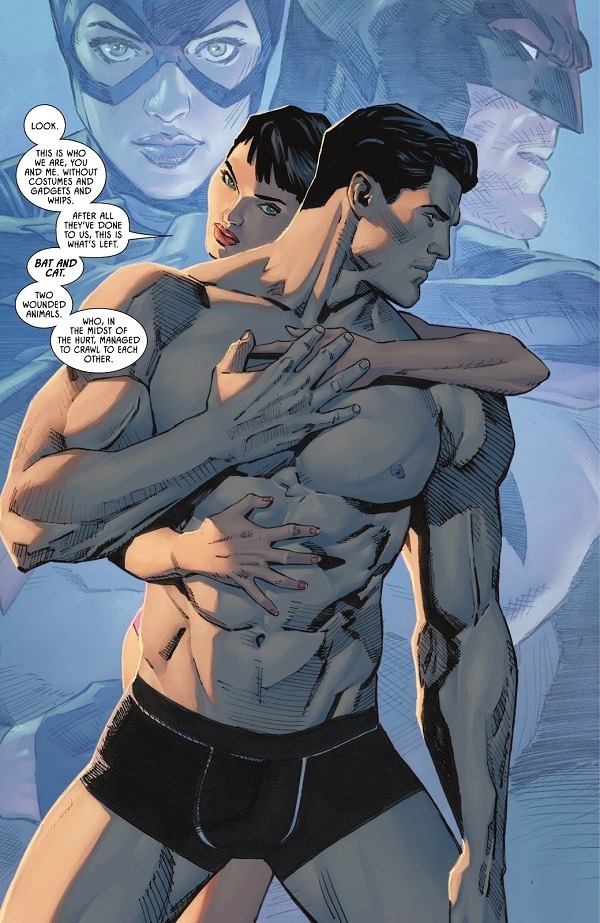
(Ummm so what if in this instance the cat wounded the bat but the bat didn't know? And is this a bonding moment or a Calvin Klein ad?)
These panels come before the reveal that Andrea is still alive, so the appeal to Selina and Bruce's connection is in earnest. It's only later in the issue that the reader is privy to how wildly fucked up this is! On Christmas!
And then it gets even worse, because now, now, is when Selina and Bruce finally get legitimately married. It's not clear if it's that same night, but it must be within a week because the chapel still has Christmas music in rotation. Selina has just finished plotting for Bruce to witness the fake-but-heartwrenching suicide of one of the loves of his life, and then she marries him!

(True love conquers all when you've manipulated your partner into another bout of grief.)
In the future, temporary fugitive Selina joins Andrea on a tropical island, and the fake suicide is framed like a clever ploy the women pulled off, a bizarre compromise to get around Bruce's rule, but it just shows... contempt, honestly? And not for the first time, after Selina's inexplicable refusal to tell Bruce Joker's location, after her angry realization that Bruce and Joker are so much alike, referenced again here:

There's also a strange vibe with something Selina says to Helena at dinner, after Joker's murder:


Very "I held out long enough to kill the clown and get all Bruce's money. :)"
Then there's Selina's relationship with Helena. Before the heartwarming scene between them I shared above, in B/C #10, they have a physical fight during which Selina expresses a lot of hostility toward her daughter for embodying Bruce's brand of justice.



That last one may seem irrelevant, but I think it speaks to the point. Calling your daughter ungrateful when she's doing what you know she was taught? Seems like there's anger at the teacher!
And when all is said and done, Selina convinces Helena to not be like her father and to let her mother walk:

Selina does also say favorable things about Bruce, and at times expresses regret that she couldn't live up to what he wanted. I'm not saying she didn't love him, or that holding off from killing Joker while Bruce was alive meant nothing. But as the saying goes, "show, don't tell," and so many of Selina's actions, especially loading more trauma on Bruce, outweigh the nicer moments.
In the face of those actions, the sweeping romance of that final panel in the last issue does not hold up. There's elements of a better story here, about an independent woman convincing herself to compromise for love, and at the end of her life finding more regret and bitterness than she bargained for, and not finding peace with it. But while King is able to see Selina's need to be unconstrained, ultimately his writing glosses over it and has her reconcile with the wife/mother role, while ignoring the cruelty of the deception she implements to get there.
Looking back, it feels like the primary function of telling Batman/Catwoman in such a tangled way was to obscure the mess.

(tl;dr: where is my "Selina divorces Bruce and takes him for all he's got" storyline?)
76 notes
·
View notes
Note
Why does fandom insist that robin exists to be the light to Batman’s darkness and to remind Batman keep his no kill rule because Batman is robins mentor and robin is supposed to learn from Batman that there are better ways than to kill people
(Dick: wants to kill mob guy idk his name
Jason: street kid with such a big chip on his shoulder that he tire-iorns Batman
Tim: outlier exists to force Batman to actually cope with his grief but was lonely I guess
Damian: raised by assassins and forced to do unspeakable things)
Batman should not need the presence of a child to adhere to his own moral code
I mean sadly fandom will sometimes insist* on it because it is one of the canon interpretations (link). it's an incredibly boring interpretation that I don't like, but it was pushed heavily when Tim was becoming Robin, and he was like THE Robin for many people.
I think that most of the Robins who want revenge (Dick, post crisis Jason) are not really like thinking killing people is the best way to solve their problems, it's more of born of grief and anger. My preferred interpretation is that Bruce taking them in helps them become not like him, and get past their grief, which I think is the superior version.
*tho i more of see it in fandom from people who don't like it but blame bruce for it, b/c IG he controls the meta narratives of DC comics XD
15 notes
·
View notes
Text
ok ive already listed why scapegrace is a narcissist but now im gonna explain why he has ADHD as well. will update as time goes on
1. clumsy & unbalanced. always running into shit and tripping and falling over. she literally cannot stop falling backwards over chairs istg. (also the sentence from mortal coil "Scapegrace forgot how to walk like normal people." that's iconic. me too bestie)
2. short attention span. he switches tracks on what kind of person he wants to be at least four times throughout the series. impossible to pick an ambition and just stick to it especially if he doesn't nail it the first time
3. he's creative!! as evidenced by the implication that he made the paintings in the torment's cellar, and his interest in not just killing, but killing to create awesome art. also i'm pretty sure he made his and thrasher's vigilante masks himself based on the fact that stephanie thought they were shitty masks💀
4a. sucks at making and keeping friends. her earliest recorded group of friends took advantage of her & then tried to kill her. when she tried to join the revenger's club she didn't try to engage with anyone (and was said to be surprised when someone actually did try to have a conversation with her). in her first interaction with thrasher she called him stupid and smacked him around and then offered a ride to a perceived crazy girl (clarabelle) within five minutes of knowing her. she only managed to become kind-of friends with valkyrie and skulduggery because she decided they were friends now and valkyrie decided it wasn't worth the effort to argue. girly does not know how to be social which brings me to point
4b. poor social skills. he just doesn't seem to fully understand or have the capability to adhere to traditional social rules. he overshares; half of his interactions in playing with fire were people telling him to shut the fuck up because he wouldn't stop talking about himself. he doesn't know how to read the room; he thought the torment would protect him from skulduggery (he didn't), he approached valkyrie as if she actively had some special agenda against him (she didn't, really), and he referred to people who didn't like him as friends (related to 4a as well). he doesn't know what's going on like ever
5. he has a journal
6. he's not a fast thinker when the situation demands it. he's a lil scatterbrained all the time, but in moments of stress his brain is EMPTY. please dont put him on the spot he will DIE
7. a lot of what she does is influenced by media and pop culture like we all know when she decided to be the dark and stormy knight she was thinking of batman and the concept of a zombie king is prevalent in horror media. and how could we forget slasher crasher dasher and basher. she is always trying so hard to fit into character archetypes
8. she sleeps weird
14 notes
·
View notes
Text
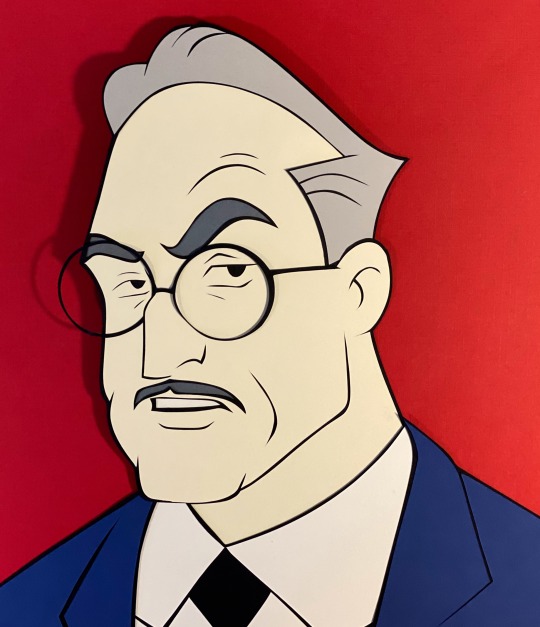
Batman: The Animated Series - Paper Cut-Out Portraits and Profiles
Mayor Hill
Hamilton Hill was a successful lawyer in private practice before running for public office. He initially won a position of Councilman and gradually matriculated through the ranks and was eventually elected Mayor of Gotham City.
One of his first acts as mayor was promoting the construction of Stonegate Penitentiary under D.A. Harvey Dent's request, with help of Bruce Wayne and the Wayne Foundation. Early in his tenure as mayor, Hill was highly critical of The Batman, going so far as to assembling a task force to take down the Dark Knight led by Detective Harvey Bullock. Although Hill’s attitudes toward the hero mellowed after his son Jonah was rescued by Batman.
During his time on the city council, Hill was associated with Temple Fugate, who ran an efficiency consultancy that contracted with the city. Hill recommended that Fugate learn to relax and not adhere to such a staunch personal schedule. Fuguate would go on to blame Hill’s advice for his being late to a ruling that resulted in the bankrupting of his company. Years later, when Hill was running for his second term as mayor, Fugate resurfaced as the villain known as The Clock King. Herein, Fugate attempted to humiliate and murder Hill. Fortunately the mayor was saved by Batman.
Hill was one of the city luminaries abducted and replaced by a robotic duplicate by HARDAC. He was also kidnapped by the villainous Lockup who felt Hill was too lenient on crime. Some time thereafter, Hill was held captive by The Joker who threatened to blow up the city with a nuclear bomb. On all of these occasions, Hill was saved by Batman.
Actor Lloyd Bochner provided the voice for Mayor Hill with the character first appearing in the second episode of the first season of Batman: The Animated Series, ‘On Leather Wings.’
3 notes
·
View notes
Note
001 for Butchlander and 002 for Homie, because I love to be obvious!
Tackling them out of order.
002 | Homelander
* How I feel about this character:
I want to mush him and squeeze him and torture him and pet him and never let him out.
Oh and he’s a very interesting character and a joy to write. Somewhat as a result of the writer’s room, and somewhat as a result of Antony Starr’s acting.
* All the people I ship romantically with this character:
I’m a whore, I will read him having sex with just about anyone, and I could make a case for him getting romantic with many characters on the show. Top romantic (heh loaded word) ships are Butchlander, Homewell, Maevlander, Starlander.
* My non-romantic OTP for this character:
I honestly don’t know what this question means because all my ships are horny ones. But I wish we got more Black Noir being a father figure to him (I wish Noir had more to do in general before they decided to give him some background just before killing him off).
* My unpopular opinion about this character:
Hmmmm. I’m a little afraid that if Kripke writes him a “redemption arc” in the show they’ll botch it with some incoherent drivel à la s3e8 so I’d almost rather they just didn’t.
* One thing I wish would happen / had happened with this character in canon:
I have more than one.
I’d rather see him depowered and live than die at the end, somehow.
I would have liked to see more of him trying to parent Ryan with Becca around.
I kind of wish he hadn’t killed Stillwell but mostly because I thought she was a cool character.
I wish he hadn’t taken over Vought because that decreases the chance we’ll ever see him operate outside of it.
* my OTP:
Billy Butcher reprogramming HL with tough, but genuine, love. And sex, definitely lots of sex. [refer to section below for much more word vomit about them]
* my cross over ship:
Heh, I think Makima from Chainsaw Man has a nice parallel to the Homewell dynamic. I’d read Batman x HL, I feel like Batman could deal with his bullshit effectively.
* a headcanon fact:
Homelander prefers his sexual partner be strong and wield soft power over him.
============================
001 | Butchlander
* when I started shipping it if I did:
Because I was watching the show very rapidly, I didn’t start shipping it outright until S1E8, but if I had a week between each episode it probably would have materialized no later than E6.
* my thoughts:
Scorchingly, achingly hot. The show canon is stingy with their onscreen time together, but each scene they meet in is glorious. One of the reasons I’m willing to overlook the inconsistent writing in s3 is that they are ramping up the butchlander element in the show. I love that they have ended up sharing a child while both being utterly unequipped to parent. I don’t remember any other enemyslash pairing setting that up and it’s so damn fun.
* What makes me happy about them:
I like to imagine scenarios where their respective traumas and defects (I don’t think they’re “the same”, kripke) fit together in such a complementary way that they end up accidentally helping each other become a little more emotionally functional.
* What makes me sad about them:
One of them lost his wife because of the other and that is a hard wound to heal.
* things done in fanfic that annoys me:
I don’t like when Billy cries too much. I don’t like when writers go all out with Butcher’s cockney but it sounds like Dick van Dyke (easy to criticize, hard to adhere to this rule). I’m more tolerant of different HL characterizations because I think canon has shown us more variety from him in different scenarios, but I tend to enjoy it less when he’s written as a sadist monster with nary an indication of any other emotions.
* things I look for in fanfic:
Generally prefer Bottom the Homelander [not because he has a better ass, but] because the fic is more likely to characterize both of them in ways I find more IC. Generally like when they at least start out antagonistic and hating each other if it’s a multichapter. Love when there’s an element of coparenting Ryan involved. Love when it’s an E rated fuckfest because [I’m here for the porn canon won’t give us, and] they are both presented as characters with energetic libidos.
* Who I’d be comfortable them ending up with, if not each other:
Honestly? I feel like they’re both likely to end up alone, because I feel bad for whoever ends up with them if they’re not a strong person. Billy with Maeve, as alluded to in the Maevlander post seems fine endgame to me. Butchie is a big fat nope for me, not only because of Annie but because it gives me incest vibes since he sees him as a younger brother. Billy with some strong woman like Rainer probably works. Homelander… needs someone who can spank him if he gets out line. If Victoria Neuman can become that person remains TBD.
* My happily ever after for them:
Haha, I’ll take almost any iteration where they end up together and parent Ryan. I’m intrigued by Billy getting upgraded with Compound V and how they’d keep from becoming a terrible powercouple of supe cunts. I’m intrigued by HL getting depowered and Billy having to rehab him into being a functional human being out of that mental wreckage. I’m intrigued by them staying as human x supe, with both of them having a weird love hate relationship with being involved with a “race” they generally looked down on.
* who is the big spoon/little spoon:
Billy is the big spoon. I will only entertain the thought of HL being the big spoon if it’s written in Russian for reasons I can’t quite fathom and must have something to do with early childhood traumas 😂
* what is their favorite non-sexual activity:
They are pretty different people in terms of pastimes in canon. I named enjoying the outdoors in another meme. I’d like to think they’d also both enjoy having (or aspiring toward having) a normal family life, raising a child as if they’re normal, well-adjusted adult men, doing normal domestic things. Emphasis on the as if.
27 notes
·
View notes
Text
Batman and Discworld
Right up front I’ll say my consumption of Batman materials consists of having liked the ‘Batman and Robin’ movie in the 90s (yes, the one with Freeze and Ivy) and reading Batfamily fanfic, so take this as it is.
But I just finished reading Terry Pratchett’s Discworld series and all I could think of is just...what would happen to Gotham if Vetinari and Vimes and the Vimes family ended up in Gotham?
Because I can just see it: Batman has no idea where this new mayor comes from and he has some...odd...ideas about how to control crime. And he added some rough dude to be Gordon’s right-hand man at the GCPD who Batman would think was from Crime Alley except he keeps complaining about the streets feeling wrong? And his wife has somehow made herself in charge of the mutant lizards down by the docks, creating an entire sanctuary out of tape and trash while talking like she’s from Bristol?
The Batfamily starts investigating. The Red Hood quickly switches sides when Vetinari hires him to control the Crime Guild: Jason now legally controls all of crime in Gotham, though the Crime Guild has its own subguilds like the Thief Guild and the Drug Guild and the Seamstress Guild (Jason doesn’t get why Vetinari keeps calling prostitutes ‘seamstresses’ but the woman in charge of the subguild likes it so he lets it go). Jason can also ‘deal’ with anyone who goes against Guild rules with impunity and even gets rewarded by the duly elected head of Gotham’s government.
Batman is gritting his teeth because he’s dealt with corruption before, but this is something different because Vetinari doesn’t try to hide it and people love him for it. Gordon even loves it because Vimes took one look at the GCPD and is now vigorously helping the commissioner root out bad cops and making them work while being just as down to earth and chain-smoking as the rest of them. And of course, Vimes won Gordon’s best-friendship when the man looked up to the shadows and said ‘Stop standing over there and come do some actual work, Batman’ before the vigilante could reveal himself. Seriously, Vimes has never not seen the bats in the shadows, even Black Bat, and Gordon loves how frustrated it makes them.
And the thing is, if Vimes were working for anyone else other than the obviously corrupt and crime-controlling Vetinari, Batman would also love him because the man absolutely despises guns. Like, won’t use one, hates to see his men using them, will go out of his way to absolutely trash any gun that comes into his hand, doesn’t even say the word correctly. He’s a family man, devoted to his wife and son, and seems to get Gotham despite having no record of ever living there before. But even if Vimes seems to hate the man, he’s clearly Vetinari’s dog so Batman can’t trust him.
(And no, it has nothing to do with the fact that Damian is now working part-time at the Sybil Vimes Mutant Lizard Sanctuary and comes home every time excited to talk about the Vimes family and Little Sam is his best friend and Lady Sybil - yes, Father, I said Lady Sybil, she is deserving of the title - is the best at getting the lizards to not spit venomous tar at people and Captain Vimes seems to really understand the criminal element of Gotham with a mix of understanding and absolute adherence to justice and. It has nothing to do with the fact that Jason regularly has dinner meeting with Vetinari and introduced him to Alfred who took to Vetinari like fire and more fire. Nothing to do with Dick teasing him about being seen in the shadows. Nope, Batman knows Vetinari is up to something and he will stop it.)
(Vetinari is up to making Gotham actually a livable city. His way worked once, it should again. Now if only Bruce Wayne would stop dressing up like a vampire and getting in his way and fall into line, that would be great.)
11 notes
·
View notes
Text
Ok so I’m reading Titans Tower AUs where Jason goes ‘kill the Replacement’ straight to ‘must protecc the child’ real quick (those are the best) and I just read the part of the dialogue where Tim tells Jason that he’s been cleaning up Gotham ‘the easy way’ in reference to how the Red Hood is a killer
And now I’m thinking of this piece of dialogue in a new light because, what if Tim Meant that literally like “have you ever had to disembowel someone with just a spoon???? No, you use guns to kill people and actual knives to decapitate their heads instead, you noob. Only real killers know how to decapitate someone with a pencil and let me tell you that it’s harder than it seems”
Meanwhile Jason is all offended because did Robin, the one who follows Batman’s no kill rule, just criticize him on how he kills people instead of criticizing him for, you know, actually Killing people???
I can just imagine this conversation is going on in the kitchen of Titans Tower with Tim in his pajamas and Jason in full Red Hood gear in the doorway because this was supposed to be an ambush but now he’s actually kinda offended because of course he could kill someone with a spoon and threatens Tim again only for Tim to flip that Uno Reverse card and literally arm himself with a spoon, brandishing it in front of himself like it’s a knife, and just going like ‘bitch I’m not Robin right now so let’s go, I’ve been a little out of practice and it’s so nice of you to offer to be my next victim’ with a little creepy grin on his face and suddenly Jason feels the embodiment of the meme: *nervous laughter* “what the fuck”
Somehow, Tim manages to pry Hood’s helmet open with the goddamned spoon and hey, Jason should really buy some silverware like that and he’s half tempted to ask Tim where he bought it from, and damn who knew a spoon would be such an effective weapon and oh my god this kid is actually crazy why does he know how to use a spoon as a weapon Jason better not go out via spoon now that’s just embarrassing; at this point there would be no life threatening injuries on either one of them, though Jason did manage to cut the kid’s throat at some point and got a spoon to the shoulder for his troubles but now they’re both tired, the Pit of Green Juice is quiet in the back of Jason’s head and ok, maybe he can, begrudgingly, admit to being impressed at how well Tim can fight with a spoon but it’s mostly just concern as to why he knows how to fight with a spoon and Tim is just like ‘Look Jason, yes I know, don’t look at me like that, just, let’s call it a truce and go patch up because I don’t want to kill you but I will have no problem strangling you with your own intestines if you keep trying to kill me ok? Ok’ and at this point Jason really doesn’t think the kid’s joking all that much so he agrees to the truce between them (let’s face it, having the Big Bad Red Hood get taken out via spoon would just be so embarrassing that Jason wouldn’t find peace even in death)
And it’s not until they’re both patched up that Jason decides it’s safe enough to ask about why Tim said that he’s not Robin right now (there’s no more spoon in Tim’s hands but he’s still on alert because the kid is just insane enough to try and bite him); and Tim’s like “uh, yeah I follow B’s moral code as Robin but I’m not particularly attached to it? Like, it’s not my moral code, whatever that is, and I’m not actually part of the family so just think of me as more of a close coworker? Anyway, I am and will always be a Drake, my family motto is literally ‘May Our Enemies Choke on Their Blood While Our Hands Remain Clean’ so you can get a picture of how I grew up, and to answer your questions, yes I have killed people, no I don’t really regret it, they were really bad people, yes i will throw hands again, no the Bats have no idea, and yes I have had to decapitate someone with just a pencil and disemboweled someone with a spoon, so yes I am actually qualified to complain about how easy you people with guns and knives have it when it comes to killing people because I would’ve loved to have had at least a pocket knife back then, hell I would’ve taken a sharp icicle but no, the only thing available was a pencil so I had to make do, also no, I really don’t want to kill you, I actually like you but please stop coming after me and we can just meet up to kill some of the more evil Rogues sometimes, we can even make it look like an accident”
Jason is just so Shooketh at this point that he will just focus on the last sentence for now because he doesn’t have the brain power to battle through that dump of information right now so he’s like ‘what would you know about setting up accidents Timbit’ cue Tim being like ‘well, it wouldn’t be all that hard to just mislabel a few chemicals in Joker’s newest hideout and have him blow himself up while trying to make a batch of Joker Gas, a sort of poetic justice when you think about it’
Basically, an AU where Tim wasn’t trained by Bruce first so he has a different moral code (whatever it is) and has been in just enough crazy situations to warrant his bizarre skills with a spoon
#new AU#tim drake#is basically also a killer#but not while he’s Robin#that’s when he adheres to Batman’s rule#because Robin is a symbol and it shouldn’t be tainted#and then Jason comes back#and ambushes Tim at Titans Tower#but Tim isn’t Robin at that moment#so he doesn’t hold back from fighting Jason#in his pajamas#while having his weapon be a spoon#because his life has been a series of bizarre events where he has had to disembowel someone with a spoon#Jason and Tim come to a sort of truce#and Jason is basically the embodiment of the meme: *nervous laughter* what the fuck#he also kinda wants to ask where Tim buys the silverware because that’s one resilient spoon you stabbed me with#basically Tim and Jason being the murder birbs when Tim isn’t Robin#but of course the Bats don’t really know about that side of Tim’s life#and he’s trying to keep it that way#and now only Jason knows just a little of what’s going on#but like#he isn’t a snitch so it’s fine#and he also doesn’t want to find out what it’s like to be taken out via spoon#which is just something so embarrassing that he wouldn’t be able to find peace in the grave#so Tim and Jason have a bonding moment#and decide to kill the Joker#but make it an accident#and then they do#batfam#bruce wayne
99 notes
·
View notes
Text
20 Writing Things I Wish I Knew 20 Years Ago
It’s my birthday. At 32 I feel old. I am still full of things I wish I learned earlier, when I started trying to become a writer. A lot of regrets for time wasted and mistakes made. So here is the 20 basic things I wish I knew 20 years ago. Maybe some of it will help someone else save off some time on their own path. If not, maybe you all will have a good laugh.
1. All Advice is Subjective
You will notice a lot of the points on this list are mutually contradictionary or make you go “this is just like an exception to point X”. This is by the design. All advice and all thoughts on writing you will ever read, this list included, is what is working for the person who wrote it, within the framework of their personal perspective and preferences. It may not necessairly work for you. Moreover, I am a person who often goes “but what about...?” when being told something only works in a specific way. There is an exception to every rule that is often a different rule for different purpose. I would even say that every contradictory pair or rules exists on a sliding scale and it is your decision towards which you lean more or whenever you disregard one enteirly in favor of the other. Cherry pick what works for you, disregard the rest, if you find everything I say trash but walk out of this post picking even a single thing you find worth remembering, my time writing it was not wasted.
2. Rules Are Made to Be Broken
One of ironclad rules is that you can never make your hero too strong. That if they can just rollstomp over every opponnent then the tension of the story is enteirly gone and no one will care. We can look at several titles that didn’t listen to it and never gained any fame, now being doomed to obscurity forever, like Hellsing, Overlord or One-Punch Man. Wait, they’re all popular? And most popular superhero of all time is Batman, despite being at this point a giant meme about how he always wins?
(sidenote: don’t come at me with some crap how Batman struggles or you can believe he is in actual danger, it may be just me but I never could beleive he will be anything, but midly inconvenienced at best, since he unbroke his back in the 90′s. Not even when he was laser-point nuked in the face by cosmic god of fascism, from which he walked out perfectly fine btw)
For every rule you will read, there is a perfectly good way, several even, to disregard or break it enteirly. Honestly, you can do whatever you want, as long as you know what you’re doing. As a matter of fact, you should question every rule, even on this list. As I have said before, they often are made by and for people with specific outlook in life, that reflect on their writing.
Just so you don’t think this is baseless rambling, even the pros are questioning the validity of supposedly fundamental rules all the time. I’ll demonstrate this on a big one: Viet Thanh Nguyen has argued in 2017 that the “show don’t tell” rule, which so many take as gospel, is a rule invented for white people born in country they publish and pretty much useless for POC and immigrant writers, who may often need to describe emotions and experiences impossible to show. Eric Bennet points out the rule was, not even joking, part of CIA’s Cold War propaganda effort. Cecilia Tan on the pages of Uncanny Magazine #18 opens her own dissection of the rule with “ Yes, the dreaded “infodump” is seen as a hallmark of bad writing, but it’s faulty logic to conclude that therefore all infodumps are bad. Try telling that to Neal Stephenson the next time he wants to exposit about Sumerian”.
3. You Cannot Break What You Do Not Know
Fuck ‘em rules, got it? However, you cannot accomplish it without actually knowing the rule, what it does and why people adhere to it. The cases of ignorant gracefully stumbling into a great subversion or a fresh take on a cliche are few and far in between. It’s not that they do not happen. but the chances of you managing to pull it off are too slim to attempt it deliberatelly. If you want to break the rule you first need to understand how it works and where are it’s weak points and most importantly, what happens when you do break it.
4. You Can Have Too Much Of A Good Thing
This really applies to anything I will advise, but since we mentioned breaking the rules and subversion, it comes with perfect illustration. Why did Game of Thrones finale suck so much? In my belief it is because the show was designed on the principle of subverting, deconstructing and defying as many tropes of classic fantasy, chilvaric legends and fairy tales as possible. And that did carry it on for a very long time by the sheer novelty. Then came a moment they had to actually set up the end and creators found themselves in a pickle. Because there was no way to set up a satisfying ending that did not, in one way of another, play into the same tropes and genre conventions they spent so much time tearing down. So they ended with narratively unsatisfying clusterfuck that seems more concerned with defying expectations than actually giving a proper conclusion. Staying true to what got the series popular in the first place and making something that feels narratively complete at the same time turned out to be impossible.
5. Have Something To Say
Everything you write is saying something. Everything that has a story is going to have message, themes and politics. Every book, every comic, every game. People who rush at you with examples trying to prove how such claim is wrong either do not see or willfully deny what lies at the very core of that example. That or said an exception proving the rule. Demanding someone proves to you politics of Tetris only shows that you need to be some abstract nonsense, divorced from any semblance of the narrative to not have politics in it.
You either will say something intentionally through your story and shape it to fit what you are trying to say, or you will do unintentionally. And believe me, people are gonna take different things from your creation anyway, last thing you need is to let something from your messy subconciousness slip through.
Be passionate about the story you tell, be passionate about its message. Speak of things you love, speak of your fears, speak of what angers you. Writer cannot be detached from the world, from life or from people. You’re not a dispassionate, objective observer removed from reality. I get you may be shy, or feel your own experiences aren’t worth talking about. Or maybe the memories are still too painful for you to open that particular wound. That’s okay. But I’m sure you are passionate about something. Even if your work is deriverative in some way. I touched upon it in my previous list. Even if you’re passionate about things like fictional characters or stories, there is likely a deeper meaning to them, that resonates with you. Tap into it.
6. Shut Up
Stories have different levels of clarity. In some it is obvious what is happenning, others intentionally muddle the waters to confuse the audience. Readers should put down your work having clear picture of everything you wanted to make clear. At the same time, they should be full of question and uncertan about things you purposefully left ambigious and unexplained. The former requires no explanations from the author outside the work itself. The latter should never be explained that way. If you find yourself having to go on the record and explain or clarify things you didn’t intend to left out unexplained, you fucked up.
7. Take Care of Your Needs
Don’t write when you’re hungry. Don’t write when you’re sleep deprived. Don’t write when you’re horny. In each of these cases the quality of your work is going to suffer. Even smut needs you to look at a sex scene with a rational, un-horny eye once in a while. Eat a hot dog, take a nap, masturbate. Take care of your needs, then go back to writing. If you know a scene can cause you to crave one of your needs, go take care of that need in advance and THEN write it. Similiarly if you know the writing you’re about to do may hit one of your triggers, prepare the tools of emotional support of your choice at hand.
DISCLAIMER: I have never done drugs aside coffee, not even a smoke. I have no fucking idea how this advice may interact with addictions so please do NOT take it as encouraging you to do that kind of things.
8. Characters Matter More Than The Plot
Plot does not matter as much as people like to think. At the end of day it is merely a framework within which the characters operate and interact. You can craft the most complex, intricate plot ever created. But if it unfolds for a cast of dull cardboard cutouts that have less agency than a pawn on a chessboard and seem more concerned with saying lines that will get them quoted on Tvtropes than experiencing actual human emotions, nobody's gonna give a shit. Great plot will not save the story with bad characters, but the opposite is very much true - if you have great, multi-dimensional characters and respect their choices and agency, people may stick with you even if the base plot is a convoluded storm of cliches and a mess of increasingly nonsensical events. As long as it feels that it is convoluded storm of cliches and a mess of increasingly nonsensical event that the characters made by their own choices and actions.
In RPGs an equivalent of this advice would be “situations, not stories”: Don’t design a story of what is going to happen on a session and then railroad the players to experience it. Create a situation, have a plan how it would develop if the player characters never got involved, then let them wreck it with their own choices and decisions. I’m not sure it is applicable to writing, however. At the end of the day YOU control ALL of the characters. They aren’t real and do not make their own decisions, you do it for them. Ultimatelly all chocies they make are serving to tell the story you want to tell. However if you can convince the readers of the opposite, make them believe that characters make choices in accordance with their personalities, instead of making choices you WANT them to make, that you respect their agency first and foremost...well, that’s what we call a “character-driven story”.
9. Plot and Theme Are Intertwined
Similiar to previous point, themes you are exploring in your story and the message you are telling won’t save it if the events makes no sense. The plot should complete and explore the theme. That means plotting the events that show the protagonist issues related to the theme and force him to take a stance. While showing and exploring opposing viewpoints to intended message can help with that, overall the main character should journey to learn the lesson you want the audience take from this work. Or, if they have a negative arc, they should learn all the wrong lessons so that the audience can see their downfall as a cautionary tale. If your theme is that murder is wrong but the plot rewards the protagonist for killing until he makes a sudden turn in the finale, suddenly feeling bad for killing a girl he fancied, but not about slaughtering his way through dozens of human beings through the whole story, it will feel jarring. Unless the real message was that the protagonist is a huge asshole, that is.
10. Aesthetic Is Narrative
The stylistic choices, be it in art, set/costumes or description, are part of your narrative and inform the reader what kind of a story it is. Say a character decides to join the good guys and gets a costume change. The moment they step out of changing room will send a different message if that costume is an army uniform, a padded biker suit with red scarf floating on the wind or a black, sleevless leather jacket with a dojo symbol on the back. First one evokes an image of a rebel being brought into the fold and tempered by military discipline, second implies the character’s newfound desire to protect the innocent by bringing to mind Kamen Rider and Tokusatsu heroes, and the last suggests a “reformed, but not tamed” wildcard deciding to fight for the school he respects.
This applies to what the character is wearing but also their overall design, body language, as well as the scenery. Imagine Jenny the Thief, dressed in plain clothes, scuffling nervously through the alley, keeping to the shadows cast by tall castle walls and towers, that the narrator compared to claws of a monster trying to grab sun from the sky. It evokes a much different image that the same Jenny dressed in colorful dress with many acessories, striding confidently, wishing one of palace’s fantastic towers would be casting a shadow on this back alley, so that she doesn’t need to suffer Sun’s full attention.
If you’re working in a medium that utilizes music, this appleis as well. For evidence, listen to 3 different entrance themes of professional wrestler the Undertaker - Rest In Peace, Keep Rollin and Memory Remains - and think about how they evoke a vastly different character.
This is also why an overt sexualization of women is often so cringe-worthy. It’s not that this is always bad (though I despise it on many levels), but it has its place and time. If a vilainess shows up in a skintight latex suit with proportions and body language of a stereotypical dominatrix femme-fatale, you better be writing smut or at least a shamelessly horny pulp, not a hard science story about troubles of long-term space travel.
Important exception, of course, is a deliberate subversion. A character whose looks are supposed to evoke certain set of expectations, only for their personality to be near total opposite, when used properly can make us question the reader’s assumptions and biases. For example, my favorite DC superhero is Cassandra Cain, whose costume as Batgirl evokes an image of typical dark and gritty 90′s antihero, and who actually has stronger moral code against killing than even Batman. Be warned, however, that this subversion must be done deliberatelly and carefully, othertwise it will just become jarring.
11. Google Every Word You Make Up
Stole this one from this very website but it’s worth repeating. If you make up a term, google if it doesn’t mean something unfortunate in some language. I’m just going to point out how at some point Magic the Gathering made a character named Sram and I will never stop laughing at them for that, because in my native tounge “sram” is a very vulgar way of saying “I’m taking a dump”.
12. "Convincing” not “Realistic”
Nobody wants a realistic story. We do not care what would be a realistic outcome of doing X in real life. What people want is to be convinced this could happen. We want to believe this could happen. We can take a lot of a story, even something so over the top fantastical like Gurren Lagann or Devil May Cry. But we need some point of reference for characters actions. Dragons, giant robots, eyes that are portals to punch dimension? We can buy that easily with some bit of handwaving like “divine will” or “the X gene” or “Minkovsky Particles”. What is really important is to convince us the characters are making decisions rational humans would. Not just the characters, but the world itself. We need internal consistency to your world’s rules and to the sociopolitical actions taken by nations and societies of it.
This is why we won’t usually accept in-universe excuses for something we know is a stupid decision. Your heroine can wear an “armor” that is basically just a metal bra because “she cast a spell of protection that defends her as much as a full plate would”? Yeah, that is still going to break my suspension of disbelief. In theory there is no threat to nurses, lawyers or teachers at work. But no woman who wants to be taken seriously in any of these jobs would come to work in a bikini, would she?
I will admit, what one finds convincing can vary from a person to person and may even change within the same person overtime, as their experiences pile up and perspective is refined. You might have seen it in some recent sentiments, like “When I was a kid I found Wheel of Time unrealistic because it was so hard for the heroes to unite the nations of the world against evil. After last few years, I find it unrealistic because they DID manage to unite everyone at all”.
13. Pick Characters Who Contrast Each Other...On Equal Footing
There is a lot of advice on why it is important to make characters who are great foils to one another, especially the protagonist and the antagonist. But what people forget often is that it is important to give them enough ground to stand on equal footing. Enough narrative weight it doesn’t feel one orbits another, existing only to enrich the latter’s story. If in Iron Man II James Rhodes, Justin Hammer or Whiplash asked “ Big man in a suit of armor. Under that what are you?” and Tony Stark just replied “ Genius, billionaire, playboy, philanthropist.” , we would be quick to dismiss their question. This is because each of those characters, while contrasting Tony in different ways, is not as well-developed as him or given enough narrative weight to stand on his own, they are merely there to help tell his story. When this exchange occured in the Avengers, however, it became one of most memorable moments. Because the man asking was Steve Rogers, a character of equal narrative importance as Tony.
This is why so many people love good villains and rivals. Because they are sometimes the only people getting as much narrative pull as the hero. And yes, that is a dig at the Whiplash in Iron Man II not being well-written.
14. Make Sure Your Character Fits The Story
If Otello and Hamlet switched plays, neither would happen. Quick to action Ottelo would have Cluadius’ head on a pike before his father’s ghosts is done speaking. Always doubtful Hamlet would question Iago’s words enough to realize he is being played. Shakespeare choose to tell the story with each character because their flaws were what lead them to a tragic end in this specific situation.
Think carefully if your hero actually works for a story you’re trying to tell with them. Don’t bend over backwards to make it about a character you think will be more marketable for target audience. People can tell when you’re doing that and it always rings false to the whole story. And if you have to contrive reasons why you’re telling a story about your protagonist in the first place, the chances are that the story would benefit from cutting them out. Usually when that happens, there is someone in your supporting cast who fits the role of main character much better. For example, in the comic book version of the Boys Billy Butcher and Wee Hugie are incredibly boring choices for the protagonist, as each’s motivation to oppose evil corproation, and superheroes it makes, boils down to “they killed my woman”. Compare it with Mother’s Milk, whose entire life has been ruined by the same corporation and who lost his entire family due to that corporation’s actions, and he makes much more compelling character.
15. Not Every Trope Fits Every Story
Let us take previous point a step further. Each genre has its own conventions that you need to respect to a degree at least. There are storytelling tools that may work in one type of story but not in another. Casually killing characters for shock value may work wonders in a gripping, dark fantasy war story like Glen Cook’s Soldiers Live. But comic books like Ultimatum or Avengers Arena have shown that it does not translate well into a shared universe of uplifting superhero narratives. Readers of Cook come in with an unspoken understanding that he is writing a brutal world, where death is quick and merciless and does not care who you are. His heroes are, at the end of the day, just humans. Slaughtering superheroes right and left just makes the reader ask what exactly is different now from all those times when they saved the day with a smile. Why are they sudenly dying when other heroes are fine? Why is this edgy bad guy with tech able to kill someone who survived one-on-one with an actual god? And if you cannot provide a convincing answer, the audience will feel like you’re just flipping them a bird for liking characters you don’t care for.
16. Not Every Genre Fits Every Story
Taking the last two points even a step further, you need to make sure you are telling your story in a genre, or even a medium, best suited for it. Infamous creepypasta Sonic.exe can only work if you don’t think about what is happenning for more than five seconds. Othertwise you realize that the narrator is for some unexplained reason unable to tell fiction from reality and freaking over characters dying in a hacked copy of Sonic the Hedgehog game more than over death of his friend...and then playing anyway. A very common opinion, that I share, is that the story would be much better off if it ditched human narrator and presented itself as a dark fic, a genre always open for another “beloved character suddenly goes serial killer on the cast” story.
In more broader sense, there are things a specific medium does better from others. If your story relies on heavy introspection, discussions of complicated scientific concepts and thick worldbuilding, chances are it will work best as a novel, than a comic book. If you want to have a lot of martial art battles, any visual medium is likely going to convey it better than written prose. But even then, you need to know different forms of that medium to match your specifics. Western comics have length of 20 to 36 pages per issue, depending whenever its American or European standard. The audience excepts to get, in one such issue, roughly balanced mix of verious elements, which is why most action scenes are going to be swift, maybe only few pages. Meanwhile manga is used to hyperfocusing on a specific element of story at the time. It is also more decompressed, with longer chapters of 30+ pages on average. Meaning it fits more a drawn-out battle full of twists and turns over the course of multiple chapters. If your want to make an action-packed show or a film, live-action budget can much easier take in something closer to real life, with little to no powers, realying on choerography and actual martial arts. Meanwhile, in animation it is going to be as expensive to make two people fight one another regardless if they’re throwing around knives or laser beams. Of course if you overcomplicate on the powers, you can reach a point where it would be better off as a prose after all, which is why it is important to know what kind of story you want to tell in the first place.
17. Set Up Some Lines
Once in a while you come across a work that does something that is considered bad in this genre, medium or just this kind of story. And yet gets away with it, at least for you, if not for everyone. Maybe it does a particular trope you usually dislike but manages to pull it out just right to not bother you. Maybe they did something that made your most hated type of character at least bearable? These are worth studying as to how do they accomplish this, obviously. But it is also useful to note them as a line in the sand, so to speak. They clearly hit a sweet spot before the overdone thing becomes actually overdone. If you ever find yourself dealing with this kind of topic in your own writing, you can reffer to the line.
For example, let’s say that you’re wondering whenever to make a superpowered battle series a comic, animation or a prose. You may look at something like JoJo’s Bizarre Adventure, a franchise that has been for decades getting away with having very complex abilities and characters explaining and/or analyzing them in great detail, despite it being something that should be avoided in a visual medium. You can set up a “JoJo Line” by asking yourself - would an average character of my story need more time/page space to explain their powers than an average one in JoJo?”. If answer is yes, you should probably make this a novel.
18. What You Do Not Show (Doesn’t) Matter
If you relegate certain action or things done by a specific character to happening “off-screen” and merely be something we see a result of, or are told about, you send a direct message this thing or character doesn’t matter. If you want to make sure readers consider a character competent at something, you need to show them being competent at it. Think of every time you have seen a scene where hero bursts to the room to save a woman from a villain, only to find her fine and the baddie tied up. How many of them actually established the woman in question as a badass in her own right? I bet you it were only those where we actually have seen her fight or outright overcome the villain, not the ones where it all happenned off-screen. Adventure Time brilliantly parodied how useless this type of scene is, by showing us how an incompetent villain manages to accidentially tie himself up, in front of a very confused girl, and heroes severly misread the situation.
What I’m trying to say here is that things you choose to not show matter....because they don’t matter. Your chocie what to ommit enforces an idea what the story is about and that the part you skipped is outside of that scope. It informs the focus of your narrative and the idea of what is relevant or irrelevant. So if you want a character to be part of main cast, be wary of pushing too much of their accomplishments or arc to happen off-screen. In case of accomplishments you can skip them if you already showed character good at the thing. If you have established the hero as badass by showing them beat a big, strong enemy, you can probably skip them fighting some losers as we know what outcome will be. You can then only show hero’s fights if there is an actual risk the character losing, to use what you were previously not showing to enchance the tension. But if you ever show the character losing and all their victories are from off-screen fights, it just shows they’re a fake who cannot win against a real opponnent, and their reputation as strong is as good as an informed ability. After all, if we never see them win, how do we know their “victories” aren’t just all from enemies slipping on a banana peel?
19. Overt Complexity is Self-Congralutatory
Resist the temptation to make the villain’s plan overtly complicated. The more steps the plan needs to accomplish, the harder it is to believe when it goes off without a hitch. It is very easy to reach a point when the plan no longer makes villain look like a master manipulator, but as if they have crystal ball and can see the future, as they account for events they had no way of knowing about
Make sure to keep your villain’s goal in mind and that the plan is actually serving accomplishing the goal and not just showing how smart the villain is. I recommend studying a movie Usual Suspects for this and realizing how the villain’s plan ends up undermining the very goal it was conceived for, just because the writer wanted to make sure we see him as a mastermind.
As with everything, remember you can have too much of a good thing. Gargoyles’ David Xanatos showed us that villains who can accomplish secondary objectives can look smart even if their main goal is thwarted. But the same writers’ Young Justice has took it to a such extreme it became a joke and sucked all tension from the story - why bother caring if we know the bad guys from the Light will win? Because they always win, even if they lose, they still win.
20. It’s Okay To Figure it Out As You Go
I bet this all feels very intimidating. So let’s me make one thing clear as my closing words. You do not need to have fully fleshed out characters before you begin plotting your story. It’s okay to not have the plot all figured out before you choose the theme of your story. Hell, it’s okay to just start writing scenes with your OC and figure plot and theme as you go. It’s okay to go without a plan or unprepared, stumble and make a note of the issue. At some point you will need to make revisions anyway, first draft is always supposed to suck. Once you finish it, you can start ironing everything out so that it fits neatly together.
Anyway, Happy Birthday to me
-Admin
30 notes
·
View notes
Note
wait what's your dick characterization then? in a pervious ask you mentioned you had a pretty concrete perception of dick... do you mind sharing?
oh not at all, although it’s kinda hard for me to figure out how to put stuff like this into words so apologies in advance if this gets a little all over the place
this might be a bit of a weird place to start but given that i’m an artist i have an easier time thinking in terms of visuals, so first off: when i think ‘dick grayson’ i’m almost always referring to nightwing, but i consider ‘used to be robin’ such an integral part of his character that it informs a significant chunk of his design. like i usually draw his hair neatly cropped and parted symmetrically down the middle, reminiscent of but not exactly the same as this kind of hairstyle:
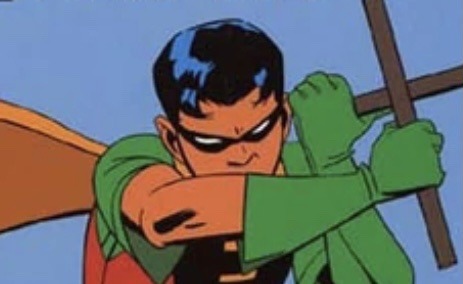
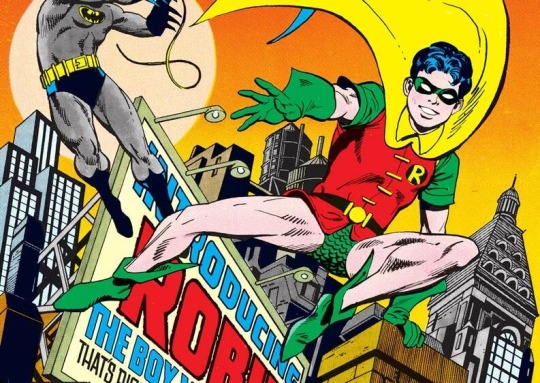
which is kinda funny considering when i do draw him as robin i just have his hair sticking up all over the place, but in my defense i think he’s too young to care about his hair here
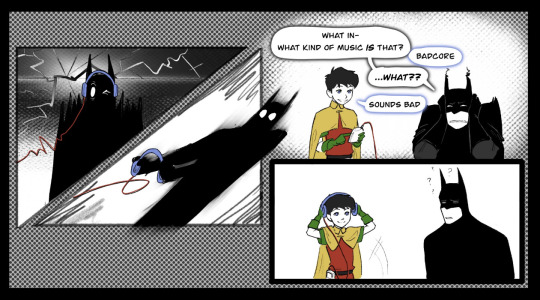
it’s not all about surface level looks though, i see even modern nightwing dick as evoking the general vibe of golden age comics, if more in idealism than aesthetics. he’s got kind of a boy scout thing going on, and it feeds into his approach to vigilantism more than anything else. that’s part of why, if you’re prone to noticing these sorts of things, i always draw him as having better posture and more dramatic body language in costume than in civvies
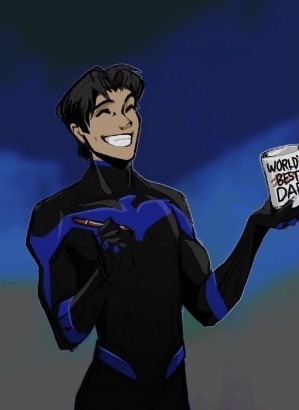
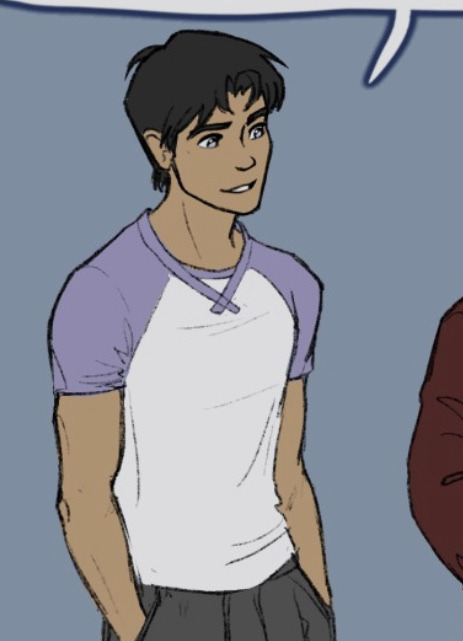
might be as good a time as any to bring up that i think dick is a standout case among all the bats concerning his secret identity — i think nightwing and dick grayson are distinct aspects of his personality, but they are both equally Him. to contrast—there’s an argument to be had as to whether or not batman is the ‘real’ bruce, at the very least his two identities seem starkly separated from each other, i don’t see cass as being meaningfully distinct from black bat/orphan(?) at all, to jason red hood is a symbol and a statement and a threat, to damian robin is a legacy, etc. dick grayson and nightwing are just different genuine pieces of the same person.
as for more specific personality stuff, despite the Classic Superhero streak i think dick is ultimately more devoted to people than any kind of moral code. so like for instance the fact that he follows the no-kill rule has much more to do with loyalty to bruce than his own ideals. i don’t think he *wants* to kill in general (more than anything else i see dick grayson as just a deeply, profoundly Good person. not to say he’s perfect or can’t make mistakes, but in my more melodramatic moments i’d just outright say his real superpower is having the strongest moral compass in the entire dc universe) but his strict adherence to that rule isn’t due to personal conviction or some kind of necessary self-control
on an interpersonal level (and i’m keeping this within the batfam bc 1) limited knowledge and 2) this is already getting long) i’ve mentioned before i think he’s got a serious case of eldest daughter syndrome, but unlike most such cases he’s actually pretty well equipped for dealing with it. to an extent. he takes on responsibility almost automatically, and has an impressive capacity for managing people and anticipating what they need (emotionally or otherwise). combined with his experience leading a team, his training, and being a naturally gifted strategist, he has a hard time justifying looking the other way when his family needs him. unfortunately he’s also one of those people who keeps operating at peak performance right up until the second he falls apart entirely, and he’s much more cognizant of his physical limits than his emotional ones.
(relatedly but kind of a side note, i have a whole Thing about his relationship with damian i’m very in my feelings about it don’t look at me)
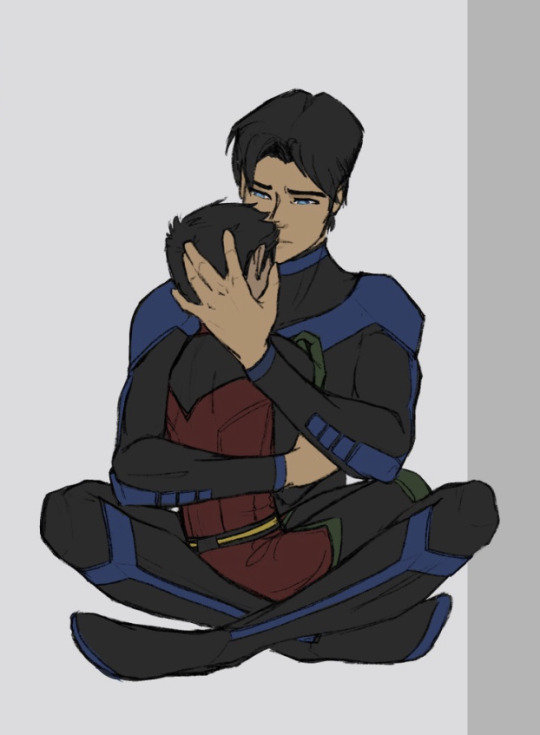
imo the fanon idea of him as The Fun One or the emotional one is wildly oversimplified and downplays his competence, but there’s a little bit of truth to it, in that a lot about dick grayson flies directly in the face of the darkness he’s surrounded by. tbh if i had my way he would always be written specifically as a slap in the face to anyone who sees kindness as naive, but i understand that my desire to weaponize fiction in response to things i find mildly irritating is “unsustainable” and “you can’t just do literally everything out of spite” or whatever
but also lowkey i think my joke character summary for him from way back in like january when i knew almost nothing abt dc and was p much just poking fun at the fandom still kinda hits
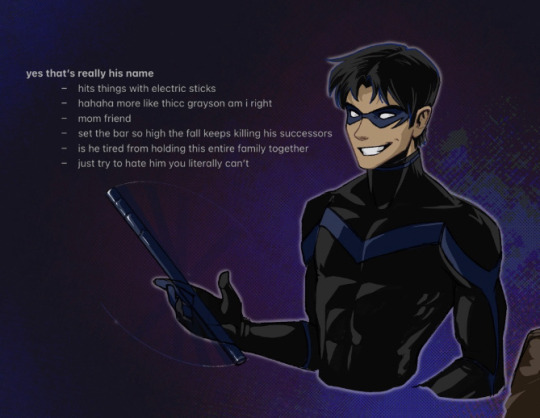
#splashasks#anonymous#long post#dick grayson#feel free to ask clarifying questions i can and will keep going about this#also WOW it’s so much harder to put my thoughts into words than art#i will admit i had a moment after receiving this ask where i was like ‘can you not tell from how i draw him’#before realizing that is insane
394 notes
·
View notes
Note
have you talked already about how batmans no killing rule reflects jewish views on justice? i would love to hear it!
hey anon! I totally forgot to do that, didn’t I?
If you’ve read my other Batman/Judaism post, I argue about the canonical likelihood that Bruce is considered halachically Jewish, though most likely does not view himself as such. You can check that out here, as well as some comic panels that suggest a slight cultural Jewish influence (here).
So, how exactly does Batman’s “no killing” rule reflect Jewish views and teaching on the concept of Justice?
One of Batman’s most famous characterizations is his refusal to kill. Though it wasn’t always present (hello guns and killing of the early Batman comics!), it’s come to shape Bruce’s personality and, in the words of Medium, makes him “a much more complex character than one who has no limits.”
Batman doesn’t kill criminals. He might injure them severely, but never to the point of (immediate) death. Inextricably tied to this rule is his refusal to use guns, likely because of his own parents’ deaths in Crime Alley. This is slightly subverted in BvS, but still largely holds true throughout his history.
So what does this have to do with Judaism?
Modern interpretations of Jewish teachings on the subject of violence are just as interesting and complex as Batman. Just like Bruce’s rules, Judaism holds a capacity for both extreme violence, and the teachings of nonviolence and the pursuit of peace.
To quote wikipedia, since my days in hebrew school were long ago, this principle can be stated as "(wherever) Jewish law allows violence to keep an evil from occurring, it mandates that the minimal amount of violence be used to accomplish one's goal."
And, again, like Bruce, within Jewish teachings, the “shedding of blood (shefikhut damim) is the primeval sin (Gen. 4:8) and throughout the centuries ranks in Jewish law as the gravest and most reprehensible of all offenses.”
Essentially, one should deescalate a situation using the least amount of violence possible, and reserve killing as the absolute last option. Sounds about right for Batman?
Interestingly, Talmudic teachings also make a distinction between killing in self-defense or in defense of another's life (supra) and killing in the preservation of life (pikku'aḥ nefesh) in general. The first is acceptable under (some, debatable) circumstances, while the latter is forbidden.
So, unlike other super heroes (looking at you, Green Arrow), Batman does not justify broader killings in the name of “saving” Gotham. In a way, he already reflects a rejection of pikku'aḥ nefesh by weighing every criminal’s life as sacred, essentially on a case-by-case basis.
In other words, no singular life is worth the overall betterment of Gotham. To claim so would put him on the further path of killing (a fear of his) and into the grey world of pikku'aḥ nefesh.
Was this characterization intentional?
It’s hard to say. Batman’s creators were indeed Jewish, but as stated above, the transition from killing/guns to absolutely no killing/guns didn’t happen immediately.
It’s also hard to make an argument of it being an intentionally Jewish-coded trait when Old Testament teachings undoubtedly influence modern, Christian creators and readers. Yet Talmudic teachings are not included in the Christian version of the OT, and the OT is quite arguably not a copy of the Torah itself.
Conclusion
Batman’s “no killing” rule reflects a core tenet of (ever-evolving) Jewish teachings, which forbids the act of killing with minimal exceptions.
Whether or not this was intentional, Bruce’s aversion to killing in the name of a better Gotham clearly reflects the divisions between killing in self-defense or in immediate defense of another's life (supra) and killing in the preservation of life (pikku'aḥ nefesh).
Dovetailing this is the concept of minimal violence, which Bruce may or may not adhere to, depending on the reader. Does beating the shit out of a criminal affect that criminal’s ability to commit acts of evil at a level of violence that is unreasonable for the situation?
Again, it’s open to interpretation, which is a very Jewish saying. And again, the saying “two jews, three opinions” applies here: I am just a lowly reform Jew with minimal Talmudic familiarity under my belt, and I certainly don’t speak for everyone on this topic.
However. The inherent Jewishness of characters or their moral codes within the DC universe (often thanks to Jewish creators) is important to me, and I think more folks should know about its roots!
I welcome any and all questions/criticisms! Thank you, Anon <3
#batman#jewish bruce wayne#jewish batman#batman's no killing rule#more on how jewish views on justice are reflected in batman's no killing rule later#bruce wayne#dc#dc comics#me ranting#sloppy first drafts of thoughts#asks#anon#thanks anon
634 notes
·
View notes